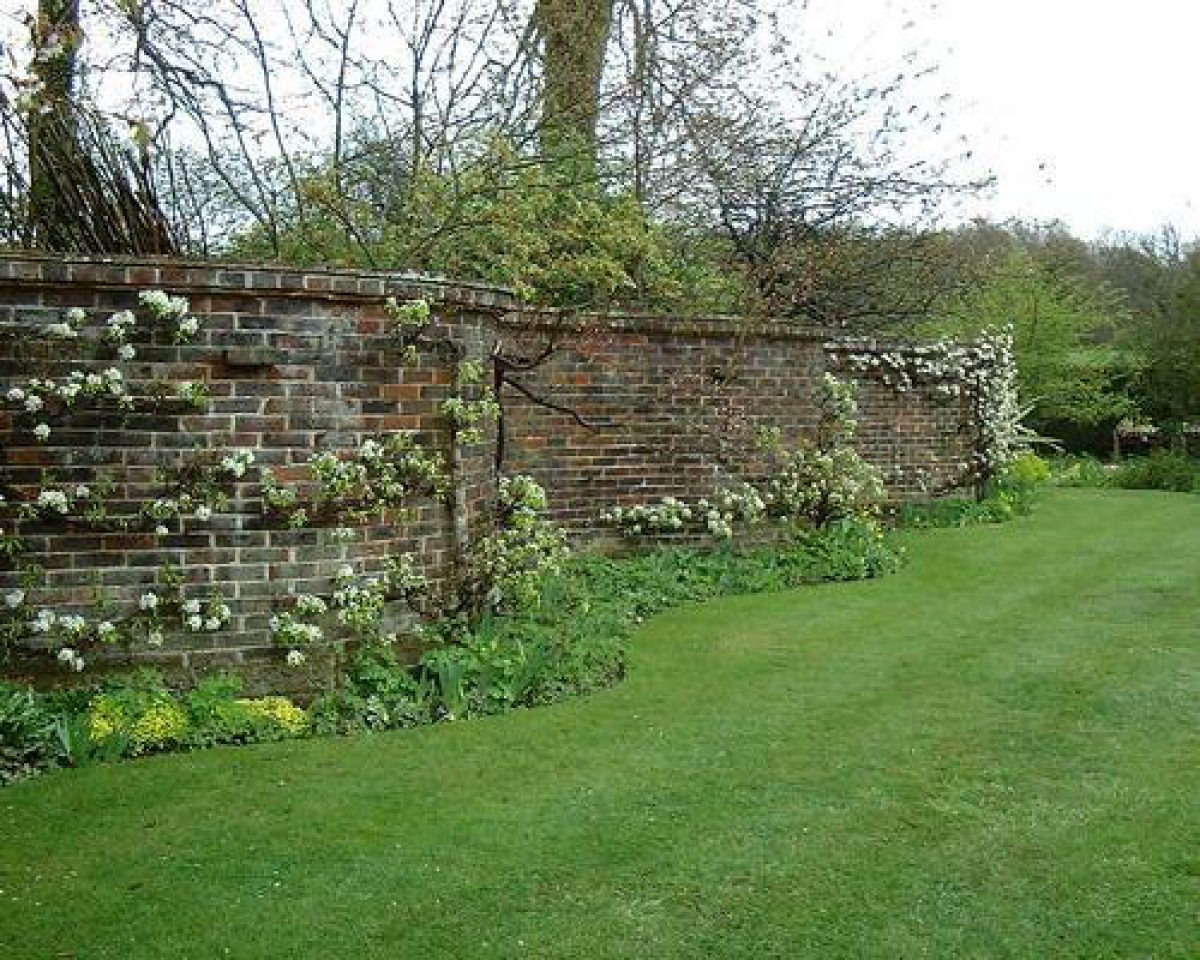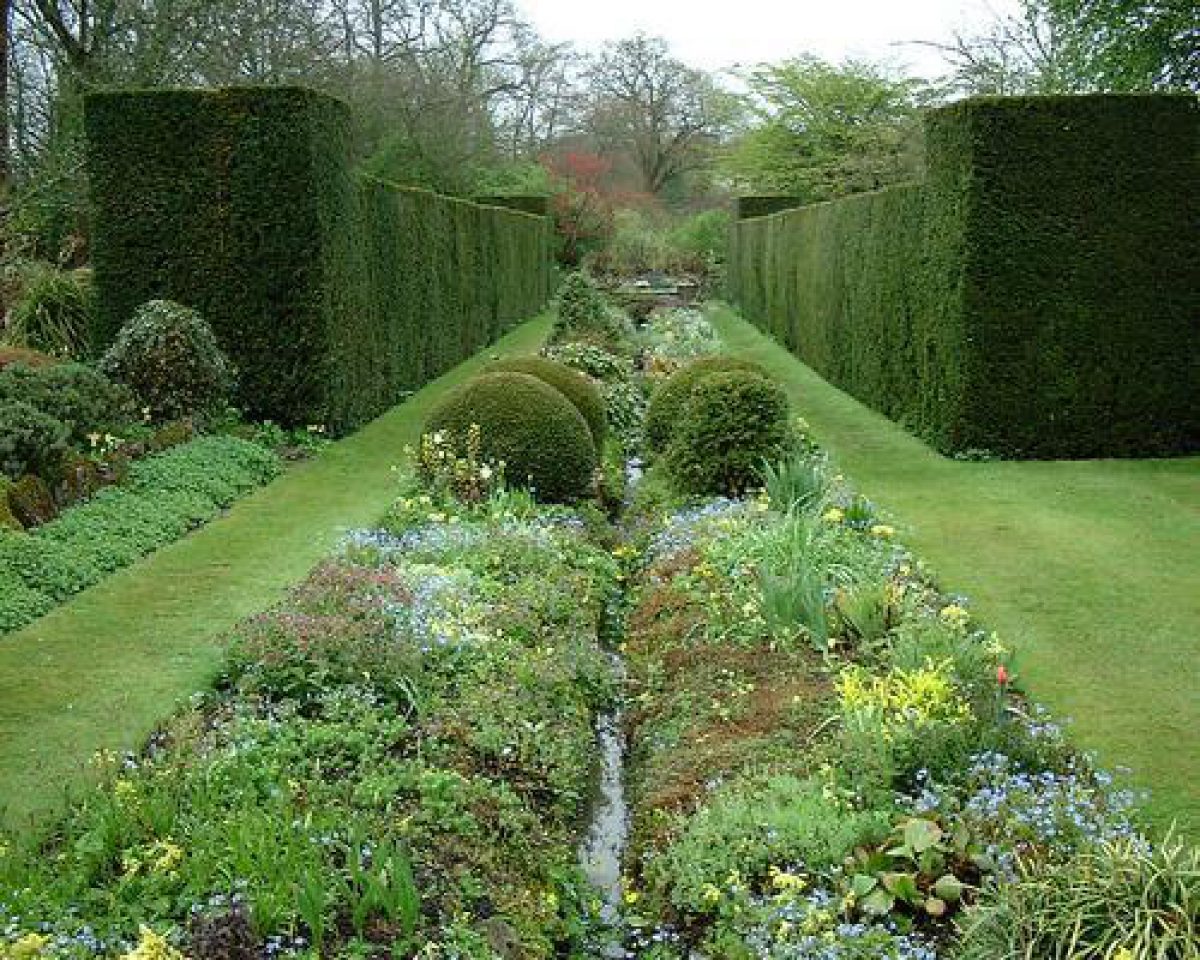

Introduction
Vann has formal and woodland gardens of some 2 hectares, merging into a natural wood of 0.6 hectares.
Terrain
The site lies in a relatively flat area of farmland.
The following is from the Register of Parks and Gardens of Special Historic Interest. For the most up-to-date Register entry, please visit the The National Heritage List for England (NHLE):
www.historicengland.org.uk/listing/the-list
An early 20th-century plantsman's garden, laid out by the Caroe family with advice from Gertrude Jekyll.
DESCRIPTION
LOCATION, AREA, BOUNDARIES, LANDFORM, SETTING
Vann is situated 7km south of Godalming, on a minor road south of the village of Hambledon, which lies off the A283 to Wormley. The elongated site, which comprises c 2ha of formal and woodland garden merging into a further 0.6ha of woodland, lies in a relatively flat area of farmland. A small intermittent stream flows north/south along the east side of the garden and descends into a narrow wooded valley. The site is almost entirely bounded by hedges, mainly beech and hawthorn, with chestnut paling within. A public footpath abuts the eastern boundary, beyond which are arable fields with views to higher land to the north. Outside the garden, to the south of the house is a grass paddock which is used as a car park during summer openings. The western boundary of the site adjoins Vann Lane which has a wide grass verge, planted with trees and underplanted with bulbs.
ENTRANCES AND APPROACHES
The site is entered on the west side from Vann Lane, through a timber gate between the end of the barn and a small timber building known as the woodshed, c 15m north-west of the house. The gravelled entrance courtyard has the main doorway into the house on its south side, a service access into the garden on the north, and in the centre a well-head surrounded by informal planting. A path passes in an easterly direction from the courtyard under an arch linking the house and the tradesman's entrance to adjoining outbuildings and into the garden. A pedestrian entrance located c 35m south of the main drive on Vann Lane, beside a timber garage, gives access to the Old Garden; beyond that is a field gate into the adjoining paddock.
PRINCIPAL BUILDING
Vann (listed grade II*) is a two-storey building, the core of which is the four-bay timber-framed hall-house dating from c 1540 to which a red-brick parlour wing was added to the south in 1689. W D Caroe enlarged the property further in 1908, building an L-shaped range to the north of the C16 house forming the entrance courtyard, and converting a range of cart sheds and pigsties to the west into a long corridor linking the house to the C18 weatherboarded barn to the north-west, adjacent to Vann Lane. Caroe converted the barn into a 'Great Hall', used for concerts. A projecting wing to the north-east of the main house, built of stone with weatherboarding at first-floor level, has stone pillars and seating niches. A stone and wood pergola continues the axis east.
GARDENS AND PLEASURE GROUNDS
The gardens surround the house, to the immediate south-west, south, east, and north and extend for a further c 200m in a long corridor alongside the stream valley, south-east from the main garden. West of the house, and enclosed by the barn wall and link corridor to the north, is the Old Garden, shielded from the road on the west by a wall and hedge. It is a formal area of rectangular beds and tall clipped yews, informally planted with Fuchsia magellanica growing through hybrid tea roses, and bordered by brick paths and grass.
South of the house, a narrow lawn, separated from the paddock by a hedge of Rosa rugosa (Blanc Double de Coubert), leads to the main lawn to the east of the house. As laid out in the early C20 this was a rose garden filled with many beds (family photographs, 1911) but in the 1970s the layout was simplified to mainly lawn. Running eastward from the house at the northern end of the lawn is a Bargate stone pergola with oak timbers leading to the pond which had been created by damming the stream shortly before W D Caroe acquired the site in 1907. The southern boundary of the lawn is edged with a row of Rhododendron luteum, and a corner bed contains a young specimen Parrotia persica.
A stone path leads south-east from the lawn to the Water Garden, where beneath the 4m drop from the pond dam a series of four pools descends into the woodland valley. Stone paths follow the route of the stream on either side and informal bridges cross the stream. In 1911, Gertrude Jekyll recommended plants suitable for the Water Garden (Jekyll Notebook 24). A formal note is struck with a stone seat giving a view across the stream to a statue. The stream bed becomes deeper as it descends the valley to an area known as Grandmother's White Garden which is carpeted with snowdrops in spring and followed by other white flowering species such as Fritillaria, Narcissus, and Lilium martagon throughout the season. The path continues beside the stream into a hazel coppice with its natural flora of bluebells, primroses, and violets. On reaching the most southerly end of the garden, the path returns on the opposite side of the stream. The beech hedge on the western boundary with the paddock contains a gateway flanked by topiary beech lollipops.
North of the Water Garden is the large pond, its present, more open, aspect resulting from the loss of several large oaks in the storms of 1987 and 1990. It is planted with a great variety of marginal plants while the dam to the south is planted with Osmunda regalis and Gunnera manicata. Above the pond to the north is the formal Yew Walk where clipped yew hedges 2.5m high flank a narrow ditch lined with rubble-stone in which the main stream flows for about five months of the year. At the northern end of the walk a stone seat, backed by a high bank, commands a view southwards between the yew hedges to the pond. To the west of the Yew Walk are island beds planted with shrubs and trees to give interest with foliage in contrasting colour and form.
KITCHEN GARDEN
A 2m high brick crinkle-crankle wall runs for c 10m east/west towards the north end of the garden providing shelter for espalier pears and peaches. To the south of the wall is the vegetable garden, a fruit cage, and a greenhouse.
At the southern end of the vegetable garden, double herbaceous borders flanking a central grassed walk were laid out in the 1990s. The borders are enclosed by a beech hedge and planted in the Jekyll tradition of graded colours. At their western end, adjacent to Vann Lane, a Lutyens-style seat on a raised plinth gives a view down the borders to a semicircular beech hedge enclosing a pedestal which formerly supported a large bowl (stolen 1997).
REFERENCES
Victoria History of the County of Surrey 3, (1902-12), pp 35-6
N Pevsner et al, The Buildings of England: Surrey (1971), p 301
Country Life, 159 (27 May 1976), pp 1394-5; 179 (26 June 1986), pp 1816-20
T Wright, Gardens of Britain 4, (1978), pp 230-2
D Ottewill, The Edwardian Garden (1989), pp 126, 222
A Lawson and J Taylor, Great English Gardens (1996), pp 52-3, 106, 155
Maps
OS 6" to 1 mile: 1st edition surveyed 1874, published 1879; 3rd edition published 1913
OS 25" to 1 mile: 1st edition surveyed 1870-1, published 1872; 2nd edition revised 1895, published 1897; 3rd edition published 1911
Archival items
Jekyll Notebook No 24 (Godalming Museum)
Family photographs, 1911 (private collection)
Description written: February 1999
Edited: January 2003
- Visitor Access, Directions & Contacts
Access contact details
The gardens are open on selected days or may be visited by appointment. Please see: http://www.vanngarden.co.uk/op...
Directions
The site is off the A283 between Hambledon and Chiddingfold.
Owners
The Caroe family
Vann, GU8 4EF
- History
The following is from the Register of Parks and Gardens of Special Historic Interest. For the most up-to-date Register entry, please visit the The National Heritage List for England (NHLE):
www.historicengland.org.uk/listing/the-list
HISTORIC DEVELOPMENT
Vann probably takes its name from 'Fenne' or 'Fanne', a fen or bog (Victoria County History), a reference to the site's heavy Wealden clay soil. The house was built by the Jennings family in about 1540 and has undergone numerous alterations and additions since then. In 1907, Vann was leased by W D Caroe, the Arts and Crafts architect, with permission to extend at his own expense; the site was only purchased in 1930 (Country Life 1986). The garden at that time was probably an informal cottage garden with some old fruit trees. W D Caroe and his wife began to lay out their garden in 1907-8, and in 1911 asked the advice of their friend and neighbour, Gertrude Jekyll (1843-1932), on the development of the woodland valley to the south-east. In 1948 the property passed to the next generation of Caroes, who restored the garden from the wilderness it had become during the war years. In 1969, Martin Caroe, grandson of W D Caroe, and his wife Mary, inherited Vann; they have continued to develop the garden within the existing framework. Vann remains (1998) in private ownership.
Period
- 20th Century (1901 to 2000)
- Early 20th Century (1901 to 1932)
- Associated People
- Features & Designations
Designations
The National Heritage List for England: Register of Parks and Gardens
- Reference: GD1235
- Grade: II*
Style
Formal
Features
- Serpentine Wall
- Stream
- Description: A small intermittent stream flows north/south along the east side of the garden.
- Hedge
- Description: The site is almost entirely bounded by hedges, mainly beech and hawthorn.
- House (featured building)
- Description: The house was built by the Jennings family in about 1540 and has undergone numerous alterations and additions since then.
- Earliest Date:
- Latest Date:
- Formal garden
- Woodland
- Key Information
Type
Garden
Purpose
Ornamental
Principal Building
Domestic / Residential
Period
20th Century (1901 to 2000)
Survival
Extant
Hectares
2.6
Open to the public
Yes
Civil Parish
Hambledon
- References
References
- {English Heritage Register of Parks and Gardens of Special Historic Interest}, (Swindon: English Heritage, 2008) [on CD-ROM] Historic England Register of Parks and Gardens of Special Historic Interest
- Ottewill, D., {The Edwardian Garden} (New Haven; London: Yale University Press, 1989), pp. 126, 222 The Edwardian Garden
- Wright, T., {The Gardens of Britain 4: Kent, East & West Sussex and Surrey} (London: Batsford, 1978), pp. 230-2 The Gardens of Britain 4: Kent, East & West Sussex and Surrey
- Pevsner, N. et al., {The Buildings of England: Surrey} (New Haven, Connecticut and London: Yale University Press, 1971), p. 301 The Buildings of England: Surrey
- Malden, H. E., {Victoria County History: Surrey, Volume 3} ([n.p]: Constable, 1911), pp. 35-6 Victoria County History: Surrey, Volume 3
- Related Documents